- Home
- Raymond E. Feist
Murder In LaMut Page 2
Murder In LaMut Read online
Page 2
‘Your money’s as green as the next fellow’s,’ one of the Muts said, and the others chuckled along with the jest that had been ancient when the Kingdom was new.
It was probably a risky idea to get into a game with regulars, but there were times for taking a risk.
Over in a far corner, near where the smell of roasting mutton oozed out of the kitchen, a game of two-thumb was going on between two Keshian mercenaries: the mad dwarf, Mackin, and a skinny, balding, puffy-faced fellow who called himself Milo, but who Kethol was certain had a price on his head under another name, and probably a local price, at that - why else would he make himself so scarce whenever the constable appeared? - and that’s where Kethol should have been playing.
If one of them took offence at Kethol’s winning, the odds were small that another would want to interfere. You could win a lot in a night when most of the time you appeared to be taking a deep draught of your beer you barely swallowed.
Here there was more risk, but there was also more profit to be had. It was just another field of battle, as far as Kethol was concerned. All he had to do was obey the same set of rules: protect himself and his friends; be sure not to draw too much attention to himself; and be sure to be one of the men standing when it was all over. And just as the best time to attack was before dawn, when the enemy would all be sleeping, the best time to gamble was late at night, when the others’ minds would be clouded with too much drink and too little sleep.
And if that seemed ungentle and unsporting, well then, that was just fine with Kethol. He was, after all, a mercenary, serving his betters for pay, and like the whores upstairs he tried to be as well paid for as little service as he could manage.
So he nodded, sat down, and threw a couple of coppers in the middle of the table, and received his placards from the dealer’s heavy hands.
He was just about to make his first play when the fight broke out at the table behind him.
You would think that men who made their living fighting would have better things to do in their time off than recreational brawling.
What was the point of it, after all? If it was practice, it was stupid practice. Neither the Tsurani nor the Bugs nor anybody else Kethol had taken up sword and pike against would have gone at it with bare fists if there was something sharp or blunt or big to hit the other with. And if it was really worth fighting over, it was worth killing over, and if that made you an outlaw, well, Midkemia was roomy enough that you could be declared an outlaw in more than a few places and still be able to earn a living, something that Kethol knew from personal experience.
Usually it was about one of three things: money, a woman, or I-just-feel-like-acting-like-an-idiot. Often it was all three.
Kethol had no idea what this fight was about, but grunts quickly turned into shouts and shouts were followed by the meaty thunk of blows landing.
He saw something out of the corner of his eye, and ducked quickly enough to avoid the flying chair, but the motion brought him into full contact with the burly regular on his right, and instinctively the Mut responded with a backhanded fist that caught Kethol high on the right cheekbone.
Lights went off in Kethol’s right eye, but reflexes worked where vision couldn’t; he lowered his head and lunged, catching the Mut around the waist in a tackle that brought both of them to the hard wooden floor. Kethol landed on top, hoping he had knocked the wind out of the other. He bashed his fist into the soldier’s midsection, just below the ribcage, for a bit of insurance. Hope was a fine thing, but certainty was better. He had nothing personal against the man he was fighting, but he was used to killing people he had nothing against, so just roughing up one didn’t count. Then he slammed his knee into the other man’s groin and rolled away. This brawl was a matter of self-protection, not anger.
That was the thing about other people that Kethol never had understood: other people - even Pirojil and Durine - often got angry during a fight, letting their anger fuel them. For Kethol, it was all a matter of doing what you needed to. You got angry over other things - cruelty, or cheating, or incompetence or waste -not combat.
A few miscellaneous blows landed on his back and legs as he rose to a crouch - the wildly flailing feet of two other combatants as they rolled about the ground - but they didn’t slow him down, and at least no knives or swords had come out, not yet. It was just a tavern fight, after all, and it was unlikely that, even drunk, the soldiers would escalate it into something more.
Off in the distance, somebody was ringing an alarm bell frantically. Most likely the tavernkeeper, calling for the Watch, for the alarm bell was quickly echoed by the Watch whistles. Clearly the Watch had been nearby, supplemented by a squad of regulars assigned from the garrison for the purpose of keeping order in the city. The Earl of LaMut might be young and new to his position, but it would be no surprise to him or his captains that garrisoned soldiers tended to fight with each other when they couldn’t find anything else to do, and the best of the Kingdom nobility were used to accepting and dealing with the inevitable.
Neither was it a surprise to Kethol; he was always half-expecting a fight to break out, and while he hadn’t been counting on it, he had been hoping for it. He made his move.
In a fight, a man being knocked down was nothing to be surprised about, so as he grunted and fell to the floor, nobody would take particular notice that his fall hadn’t been preceded by a blow. The fact that he fell to the floor where under a table several dozen of the coins had scattered was simply a matter of convenience.
He quickly scooped up a handful of coins - not worrying about the sound of clinking metal carrying over the shouts and grunts; everybody else would be too busy to notice a small thing like that - and made certain to pick out the silver reals first, before bothering with the coppers. All of the coins went into a hidden pocket sewn into the inside of his tunic, and he stuffed a rag in on top of them before pulling the pocket’s drawstring tight.
Then he was on his hands and knees, making for the door as quickly as he could: he had already taken his pay for this fight, and it was time to be going.
A tavern fight had a dynamic of its own: after a few moments of free-for-all, some men would be down, hurting; others would have paired off, working off new or old grievances of their own with their fists.
Yet others would soon be doing what Kethol was busy doing: not hanging around for the fight to turn bloody, and particularly not waiting for the arrival of the Watch, but making themselves scarce. Unsurprisingly, that Milo fellow had been the first man through the door and out into the night, and others had followed. Kethol wouldn’t be the first, or the last, and that was just fine.
Kethol launched himself through into the mud-room and through the mud-room to the entryway, brushing aside the thick sheets of canvas hung up to keep the chill air out of the tavern.
And stopped in his tracks.
They were waiting for him outside: a squad of regulars, led by a mounted corporal whose massive dark horse pranced nervously on the hard-packed snow, pawing at it with the strange clawed horseshoes that Kethol hadn’t seen anywhere except in LaMut.
A lance pointed in his direction.
‘You’d be Kethol, the mercenary,’ came a voice out of the darkness.
There was a sharp point on the lance, and no point in denying it. If there was a problem, he would have to talk his way out of it now - or, more likely, think, talk, or fight his way out of it later.
‘Yes,’ he said, his hands spread in a question. ‘Is there some problem?’
‘Not for me. The Swordmaster wants to see you.’
‘Me?’
‘You. All three of you.’
He didn’t have to ask what the corporal meant by ‘all three of you’.
‘So let’s be on our way,’ the corporal said.
Kethol shrugged.
With the stolen coins warm in his hidden pocket, he had nothing else that he needed to be doing, including dying in the street.
At the moment.
It was a dark and stormy night, and if there was such a thing as a barn that wasn’t draughty, Pirojil had never seen one, so he wasn’t surprised at the bitter cold ripping through the place as he rolled another bale of hay down from the loft, letting it fall onto the hard-packed earth below.
The horses were used to the thunk made by the bale hitting the floor, although the big bay gelding that was reserved for the use of the Horsemaster himself nickered and clomped in his stall.
Pirojil didn’t have any particular objection to doing his share of tending the horses - all of the stableboys had been pressed into service as message runners during the last-but-one battle, and all of them had been cut down either by Tsurani or Bugs, but he didn’t particularly care to be doing it in a barn that was so cold and draughty that the sweat on his nose kept freezing.
It was a trade-off, as most things in life were. The less you complained about having to muck out a few stalls, the more likely it was that your name was not going to come to the top of the captain’s mental list when he needed to send a patrol out to see if there really were Tsurani lying in ambush in the forest ahead. And if you could improve the job with more than a few swigs from a bottle of cheap Tyr-Sog wine that the late sergeant - may Tith-Onaka, god of soldiers, clasp him to his hairy, hoary breast! - didn’t have any use for any more, well, then what was the harm?
It was lousy work, but it was easy.
You just slid a hackamore on the horse, led it to an empty stall, being sure to close the animal in properly, and then forked out the old, shit-and-piss-laden straw, then spread out some of the fresh. The old straw went into the wheelbarrow, and the wheelbarrow went up the ramp and through two sets of heavy swinging doors, to be dumped onto the back of the midden wagon, after which it was no longer Pirojil’s problem. Somebody else would have to haul it out of town, and dump it. It was said that the dung of LaMut horses was why the local potatoes grew as big as horseflops, but growing vegetables was something that Pirojil didn’t know much about.
Or care.
Pirojil knew that he was capable of being as complex a man as there was, which was why at times very simple things appealed to him. As did not thinking about things that didn’t concern him. There was no point in employing his mental capacity without a good reason, after all. He had another swig of wine, gargled with it to clear the accumulated phlegm from his throat, and carefully re-stoppered the bottle before setting it down on the floor next to the ladder. The ladder could be used for getting down to the floor, but there was also the rope. And, just a short step away from the loft, a well-varnished pole stood invitingly.
Pirojil slid down the pole easily, his thick leather gloves warming only a trifle from the friction, and landed lightly. That was the trick of it, he had decided. You wanted to stop just at the floor, by your own friction, not drive your boots into the hard earthen floor.
It was a silly thing to be concentrating on, but there were worse.
Like the way women looked at him. Even the whores.
He shrugged. An ugly man was an ugly man, but an ugly rich man was a rich man, and some day he would be at least a moderately rich man, if he wasn’t a dead man first. You had to keep building up your stake, and waiting for the right moment, and in the meantime -
In the meantime, you could amuse yourself with daydreams about wealth, while you waited for the predestined spear to run you through the belly, the fated sword to find your heart, or the inevitable arrow to seek your eye.
Willem, the last of the stableboys, had gone to war with his father’s shield, and come back upon it. In his memory, the shield had been hung on the wall of the stable with the rest, and polished to a ridiculously high gloss by somebody who should have found something better to do with his time.
Thankfully, though, even as highly polished as the shield was, he couldn’t see his reflection in it. He had no particular need to see the misshapen forehead hung heavy with bushy eyebrows, over sunken, tired eyes, and a nose that had been broken enough times to flatten it against the face, and turn him into a mouth-breather.
Pirojil fingered the scraggly beard that covered his jaw. It never did fill in, and he never would permit it to grow long enough for an enemy to grasp.
You couldn’t always tell about people by looking at them. There were ugly people in this world, but many of them were good and kind. Pirojil had long ago decided that his own face was a mirror to his soul. It took something other than a gentle soul to decide to make most of your living sliding a sword into another man’s guts, and the rest of it waiting to slide a sword into another man’s, or any of the hundred other different ways of killing Pirojil had used to earn his pay.
A scritching sound sent his hand to his belt as he spun about.
He forced himself to relax. Just a rat, off in a corner up against the oat bin.
An ongoing problem, and one you’d think that the magicians would take time out of their busy schedule to handle. Couldn’t they . . . wiggle their fingers or mutter their spells or whatever they did and keep the rats out of the horses’ oats and carrots and corn? Well, it was none of his business. He wasn’t sleeping in the cold stable, and, besides, nobody was paying him to kill rats.
Something whipped past his ear and thunked into the wood of the oat bin, accompanied by a short squeal.
‘Got it.’ A tall, rangy man stepped out of the shadows, tucking a second knife into a sheath on his right hip. A basket-hilted rapier hung from his belt - the narrow, precise weapon of a duellist, not the broader, longer sword that a line soldier would carry into battle. Tom Garnett chose his weapons with care.
It didn’t much matter that Pirojil’s own sword was a good six paces away, hung on a hook while he worked. Captain Tom Garnett, the oldest of the captains fealty-bound to his excellency the Earl of LaMut, was, even in his late forties, a far better swordsman than Pirojil could ever hope to be. Whether it was the result of innate talent or more than thirty years of spending half his waking hours with a sword in his hand - or, most likely, both - in a swordfight, Garnett could easily have carved Pirojil into little pieces.
And, apparently, he had a way with throwing knives, too, although Pirojil would have thought better of him, for Pirojil had never heard of a thrown knife actually killing anybody, and it was absolutely silly to spend the gold to acquire a properly balanced throwing knife.
Pointless, really.
So Pirojil kept his hands from straying near where his own throwing knife was concealed under the hem of his tunic. Yet although he had never heard of a thrown knife actually killing anyone, he had seen one distract a man long enough for him to be killed some other way, and besides, there was always a first time; he just refused to pay enough gold for a good one, and even if he had, he wouldn’t have risked it dispatching vermin. Letting his thoughts run, Pirojil stood silently as Tom Garnett walked over and retrieved the knife, displaying the rat that he had neatly skewered.
It was already limp and unmoving in death; Tom Garnett flicked its body off his knife and into the wheelbarrow with the straw and shit, then stooped to pick up a handful of fresh straw to clean his knife with before replacing it in his sheath.
He stood a head taller than Pirojil, who himself was of more than average height, but while Pirojil was built almost as thickly and solidly as Durine, Tom Garnett was even more rangy and gaunt than Kethol. His hair was coal-black, sprinkled with silver highlights, and except for a thin moustache and tiny, pointed goatee, his face was clean-shaven, revealing a wealth of scars about his cheeks and forehead. You would expect such a tall and gangly man to seem awkward in motion, but he moved like a dancer, seemingly always in balance.
‘I seem to have taken you by surprise,’ the Captain said, making a tsking sound with his teeth. ‘I would have thought better of you, Pirojil.’
Pirojil ducked his head. ‘The Captain is kind to remember me,’ he said.
‘And unkind to criticize? Ah. That could be.’ Garnett gestured at the rat. ‘You object to me killing a rat?�
�
Pirojil shook his head. ‘Not at all, Captain,’ he said. ‘I might have done it myself.’ He shrugged.
‘If you’d cared to.’ The Captain’s tone was ever-so-slightly mocking.
‘If I’d cared to.’
‘And why didn’t you care to, Pirojil?’ Garnett asked, perhaps too gently.
Pirojil shrugged again. ‘I didn’t see any point. You kill one rat, there’s another score of them where it came from. It wasn’t bothering me, and I don’t remember being ordered - or paid -to hunt rats.’ He leaned on his pitchfork. ‘Do you want to pay me to hunt rats, Captain?’
Tom Garnett shook his head, slowly. ‘Not me, Pirojil. The Swordmaster, on the other hand, may have some rats for you to hunt, or at least to watch out for. I’ve sent for your companions; they should be at the Aerie by now. Would you very much mind coming with me?’ he asked, politely, as though it was simply a request.
Pirojil shook his head. ‘Not at all,’ he lied. He didn’t really have a choice.
Tom Garnett smiled. ‘Relaxing to the inevitable is always wise, Pirojil.’
‘That wasn’t what you said when we were almost overrun by the Bugs, Captain,’ Pirojil said. ‘I seem to recall you shouting something about how we were going to die, but die like soldiers. Is my memory mistaken?’
Tom Garnett grinned. It wasn’t a pleasant smile, being reminiscent of a wolf baring its teeth. ‘Since we weren’t overrun, it wasn’t inevitable, now was it?’
The Captain turned, not waiting for a reply, expecting Pirojil to follow.
Pirojil elected to accommodate the Captain’s expectations and silently trailed him out of the barn.
Glancing through the open gate on the other side of the marshalling yard, Pirojil caught a brief glimpse of lights from the buildings lining the road down the hill into the city proper, and considered the wisdom of building the castle on the bluff overlooking the original city. It was a fine defensive position, as long as you didn’t have to run up and down the hill in this miserable weather. Then again, he considered, those who design castles are not usually the ones sent up and down the road in the middle of a storm. That was just the sort of task set aside for people like Pirojil, Durine and Kethol.

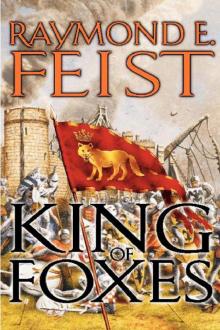 King of Foxes
King of Foxes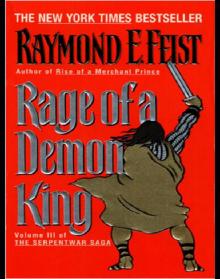 Rage of a Demon King
Rage of a Demon King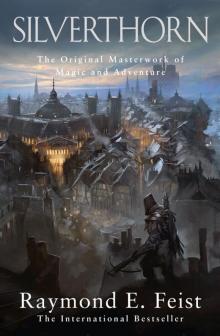 Silverthorn
Silverthorn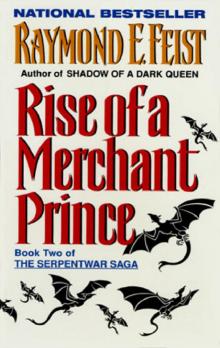 Rise of a Merchant Prince
Rise of a Merchant Prince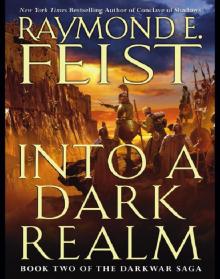 Into a Dark Realm: Book Two of the Darkwar Saga
Into a Dark Realm: Book Two of the Darkwar Saga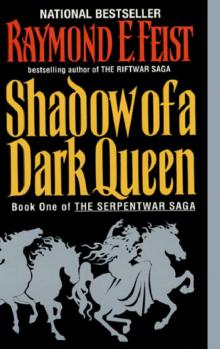 Shadow of a Dark Queen
Shadow of a Dark Queen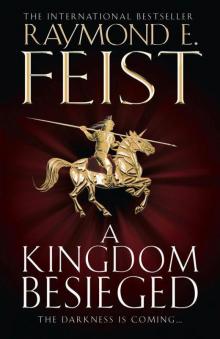 A Kingdom Besieged
A Kingdom Besieged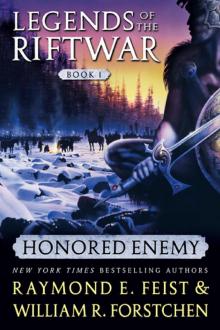 Honored Enemy
Honored Enemy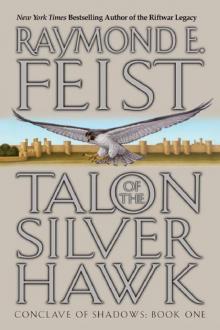 Talon of the Silver Hawk
Talon of the Silver Hawk The Complete Legends of the Riftwar Trilogy
The Complete Legends of the Riftwar Trilogy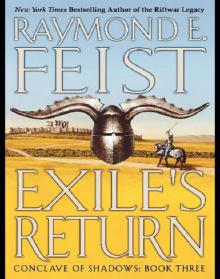 Exile's Return: Conclave of Shadows: Book Three
Exile's Return: Conclave of Shadows: Book Three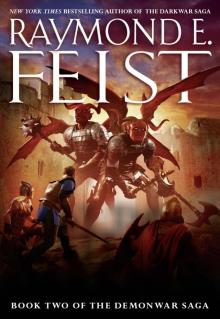 At the Gates of Darkness
At the Gates of Darkness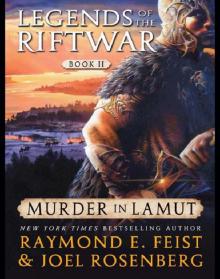 Murder in LaMut: Legends of the Riftwar: Book II
Murder in LaMut: Legends of the Riftwar: Book II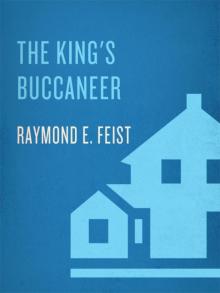 The King's Buccaneer
The King's Buccaneer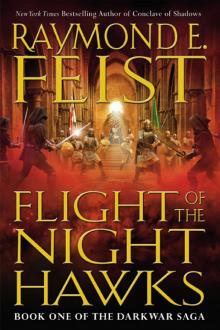 Flight of the Nighthawks
Flight of the Nighthawks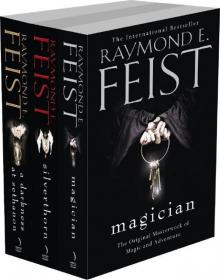 The Riftwar Saga
The Riftwar Saga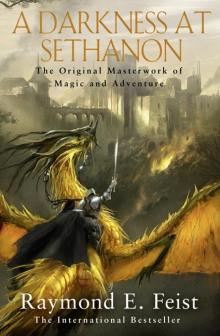 A Darkness at Sethanon
A Darkness at Sethanon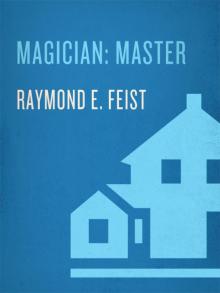 Magician: Master
Magician: Master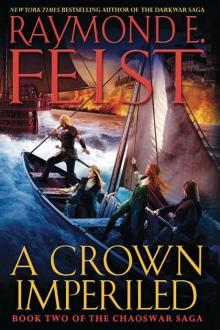 A Crown Imperiled
A Crown Imperiled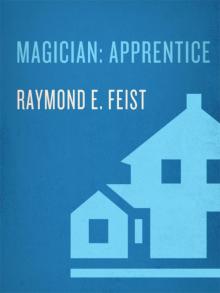 Magician: Apprentice
Magician: Apprentice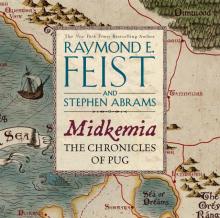 Midkemia
Midkemia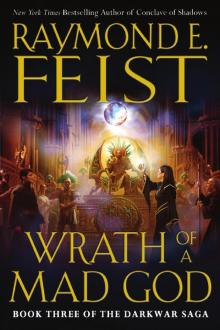 Wrath of a Mad God
Wrath of a Mad God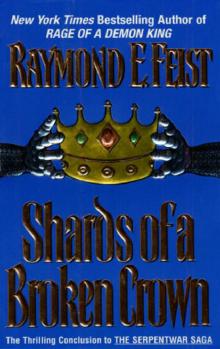 Shards of a Broken Crown
Shards of a Broken Crown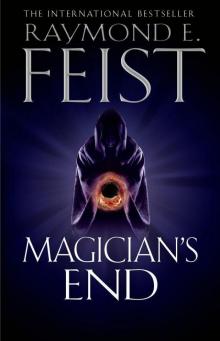 Magician's End
Magician's End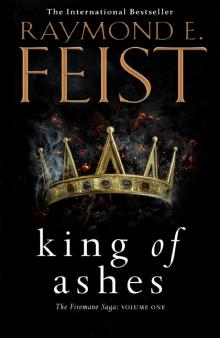 King of Ashes
King of Ashes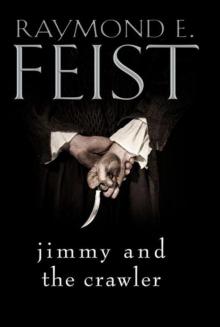 Jimmy and the Crawler
Jimmy and the Crawler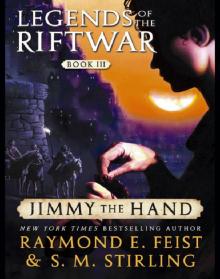 Jimmy the Hand: Legends of the Riftwar, Book 3
Jimmy the Hand: Legends of the Riftwar, Book 3 Queen of Storms
Queen of Storms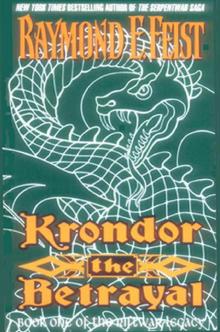 Krondor: The Betrayal
Krondor: The Betrayal Magician
Magician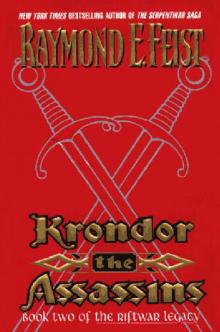 Krondor: The Assassins
Krondor: The Assassins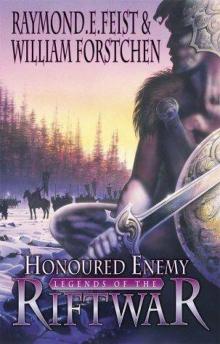 Honoured Enemy
Honoured Enemy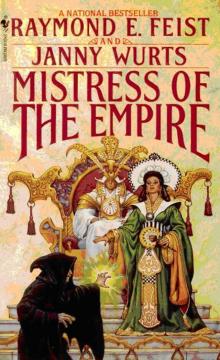 Mistress of the Empire
Mistress of the Empire The Complete Empire Trilogy
The Complete Empire Trilogy Legends 1 - Honoured Enemy
Legends 1 - Honoured Enemy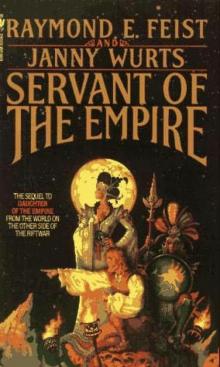 Empire - 02 - Servant Of The Empire
Empire - 02 - Servant Of The Empire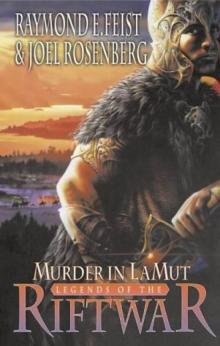 Murder In LaMut
Murder In LaMut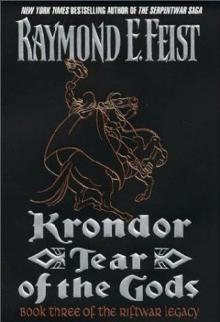 Krondor Tear of the Gods
Krondor Tear of the Gods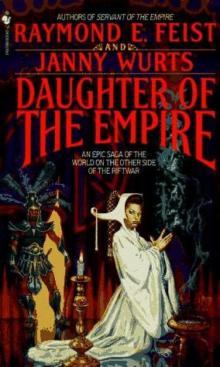 Empire - 01 - Daughter Of The Empire
Empire - 01 - Daughter Of The Empire![King of Ashes [Book One] Read online](http://i1.bookreadfree.com/i1/03/30/king_of_ashes_book_one_preview.jpg) King of Ashes [Book One]
King of Ashes [Book One]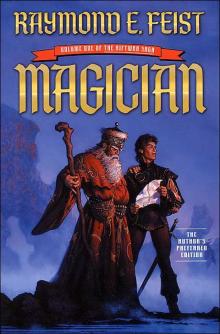 Magician (10th Aniversary Edition)
Magician (10th Aniversary Edition)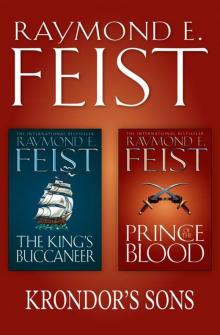 Prince of the Blood, the King's Buccaneer
Prince of the Blood, the King's Buccaneer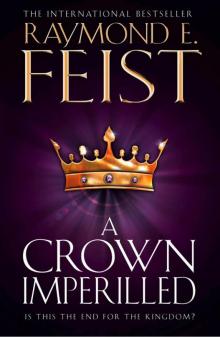 A Crown Imperilled cs-2
A Crown Imperilled cs-2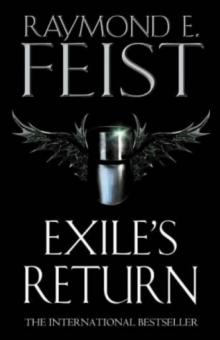 Exile's Return
Exile's Return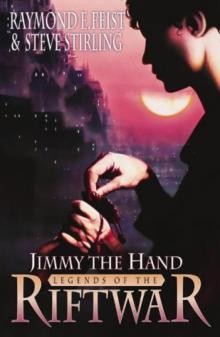 Jimmy the Hand
Jimmy the Hand Book 1 - Magician
Book 1 - Magician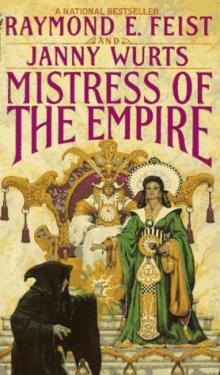 Empire - 03 - Mistress Of The Empire
Empire - 03 - Mistress Of The Empire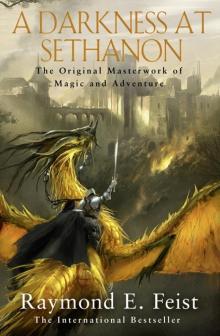 Darkness at Sethanon
Darkness at Sethanon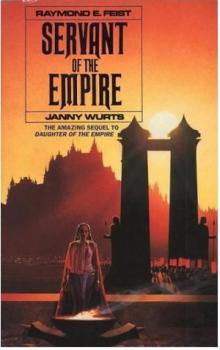 Servant of the Empire
Servant of the Empire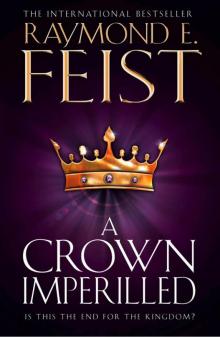 A Crown Imperilled
A Crown Imperilled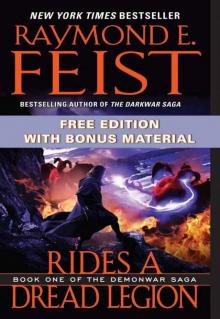 Rides a Dread Legion
Rides a Dread Legion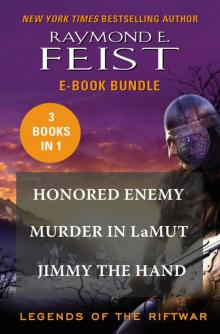 Legends of the Riftwar
Legends of the Riftwar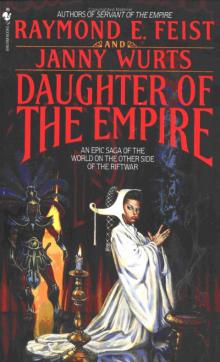 Daughter of the Empire
Daughter of the Empire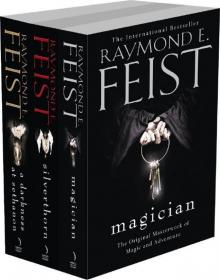 The Riftwar Saga Trilogy: Magician, Silverthorn and A Darkness at Sethanon
The Riftwar Saga Trilogy: Magician, Silverthorn and A Darkness at Sethanon